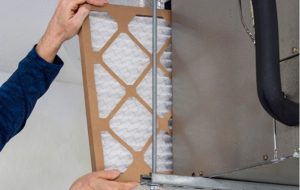If you’ve ever felt confused about the difference between an air filter or an air purifier, you’re not alone. I get it. Hi, I’m Jack De Vetten and I know that it’s crucial to understand the differences between them to make sure you have the best air quality in your home. Especially for summer months. But keeping the air clean and fresh in your home can be a bit of a puzzle. But don’t worry, I’m here to help you figure it all out!
More About Air Filters & Air Purifiers
Today, we’re going to break down what air filters and air purifiers are, how they work, and which one might be the best fit for your home. We will keep it simple and straightforward so you can make an informed decision without getting lost in the technical jargon. Let’s dive right in and clear the air (pun intended)!
The Importance of Healthy Air
Let’s talk about why it’s so important to be aware of the air quality in your home. Because believe it or not, the air you breathe can have an enormous impact on your health and well-being.
Think about it. You spend a lot of time indoors, especially at home. That’s why it’s crucial to make sure the air in your house is as clean and healthy as possible. Here are a few reasons why you should be aware of healthy air and what you can do to improve it.
Breath Easier.
Clean air means fewer irritants that can cause breathing problems. If you have asthma or allergies, you’ll notice a big difference when the air is free of dust, pollen, and other allergens. Even if you’re perfectly healthy, breathing clean air just feels better!
Reduce Illness
Germs and bacteria can spread through the air, leading to colds, flu, and other illnesses. By keeping the air clean with filters and purifiers, you can reduce the chances of getting sick. This is especially important during flu season or if someone in your home is already sick.
Sleep Better
Ever wake up with a stuffy nose or scratchy throat? That could be because of poor air quality. Clean air can help you sleep better and wake up feeling more refreshed. Plus, it can reduce snoring and other nighttime breathing issues.
Protect Your Home
Dust and other particles don’t just affect your health; they can also affect your home. Because they can build up on furniture, electronics, and even inside your HVAC system, leading to more cleaning and maintenance. Keeping the air clean helps keep your home in decent shape.
Boost Your Mood
Believe it or not, the air you breathe can affect how you feel. Clean air can help reduce stress and improve your overall mood. It’s like a breath of fresh air for your mind and body!
Understanding Air Filters
Air filters are usually part of your home’s heating, ventilation, and air conditioning (HVAC) system. They work by trapping dust, dirt, pollen, and other tiny particles that are in the air. Consequently, this helps keep the air cleaner and your HVAC system running smoothly. Think of it like a bouncer at a club, keeping out the troublemakers so only the clean, fresh air gets through.
Types of Air Filters
Fiberglass Filters – In general these are the most basic and least expensive. They do a decent job of catching larger particles but might miss the smaller stuff.
Pleated Filters – These have more surface area to catch particles, so they are better at trapping dust and pollen than fiberglass filters.
HEPA Filters – These are the heavyweights of air filters. HEPA stands for High-Efficiency Particulate Air. They can trap tiny particles, even the ones you cannot see, making them great for people with allergies or asthma.
Understanding Air Purifiers
Air purifiers are devices you can place in any room of your house. Their job is to clean the air by significantly removing pollutants, allergens, germs, and even wildfire smoke. They do not just trap particles like air filters do; they actively work to make the air healthier.
Types of Air Purifiers
- HEPA Purifiers – Just like the HEPA filters we talked about; these purifiers use high-efficiency particulate air filters to trap tiny particles. They are great for people with allergies or asthma because they can capture things like pollen, pet dander, and even smoke.
- Activated Carbon Purifiers – These use a special kind of carbon that is treated to be super porous. It is great at trapping odors and gases, like cooking smells or chemical fumes. And if you have ever noticed your home smelling fresher after using one of these, now you know why!
- UV-C Light Purifiers – These use ultraviolet light to kill bacteria and viruses. It sounds pretty high-tech, and it is! They are a great option if you’re worried about germs in the air.
- Ionizers – Because these purifiers release negative ions that attach to pollutants, making them too heavy to stay in the air. They fall to the ground or get trapped on surfaces, so you will want to clean up afterward to get rid of the particles for good.
Choosing an Air Purifier
The key to choosing an air purifier is knowing what you need it for. But if you have allergies, go for a HEPA purifier. Or if odors are your main concern, an activated carbon purifier might be your best bet. And if you want to tackle germs, look into a UV-C light purifier.
But remember, air purifiers need regular maintenance, too. Make sure to change the filters and clean the unit according to the manufacturer’s instructions to keep it working effectively.
So, whether you are dealing with allergies, odors, or germs, there’s an air purifier out there that can help. It is all about finding the right one for your needs. Happy breathing!
Choosing an Air Filter
When choosing an air filter there are several factors to consider. Here are a few.
Merv Rating.
The Minimum Efficiency Reporting Value (MERV) rating indicates how effectively a filter captures particles. The scale ranges from 1 to 20.
- 1-4: Basic filters that capture large particles like dust and lint.
- 5-8: Better for capturing mold spores, pet dander, and dust mites.
- 9-12: More effective for finer particles like pollen and smoke.
- 13-16: Best for capturing bacteria and viruses.
- 17-20: Used in clean rooms and hospital settings.
Filter Type
There are different types of air filters, each with its own benefits:
- Fiberglass Filters: These are the most basic and least expensive. They capture larger particles but might miss smaller ones.
- Pleated Filters: These have more surface area and are better at trapping dust and pollen than fiberglass filters.
- HEPA Filters: High-Efficiency Particulate Air filters can trap very tiny particles, making them ideal for people with allergies or asthma.
Size and Fit
Make sure the filter fits properly in your HVAC system. Because a bad-fitting filter can allow unfiltered air to bypass it, reducing its effectiveness.
Airflow Resistance
Some filters can restrict airflow more than others. Higher MERV filters often have more resistance, which can make your HVAC system work harder. Check your system’s specifications to ensure it can handle the filter you choose.
Filter Longevity
Consider how often you need to replace the filter. Some filters are designed to last for a month, while others can last for several months. Balance the cost of frequent replacements with the benefits of cleaner air.
Specific Needs
Allergies or Asthma: HEPA filters are highly effective.
Pets: Filters that capture pet dander and hair.
Odors: Activated carbon filters can help with smells from cooking, pets, and smoke.
Cost
While cost shouldn’t be the only consideration, it’s important to choose a filter that fits your budget. Higher-quality filters might be more expensive but can offer better air quality and need less frequent replacements.
Choosing the right air filter involves balancing factors like filter type, MERV rating, size, airflow resistance, longevity, specific needs, and cost. By considering these factors, you can ensure that your air filter provides optimal air quality and efficiency for your home or office.
So, Which One is Best?
It basically comes down to what your needs are. If you want to improve the overall air quality in your entire home. A good-quality air filter in your HVAC system is a great choice. If you have air quality issues in certain rooms (e.g., allergies, odors). An air purifier would be more effective. But consider one other option. Why not combine a good quality air filter and an air purifier in your HVAC system and get the benefits from both products?
Still not sure if you need an air filter of an air purifier? Ace Plumbing is your clean air partner. Call us today.



